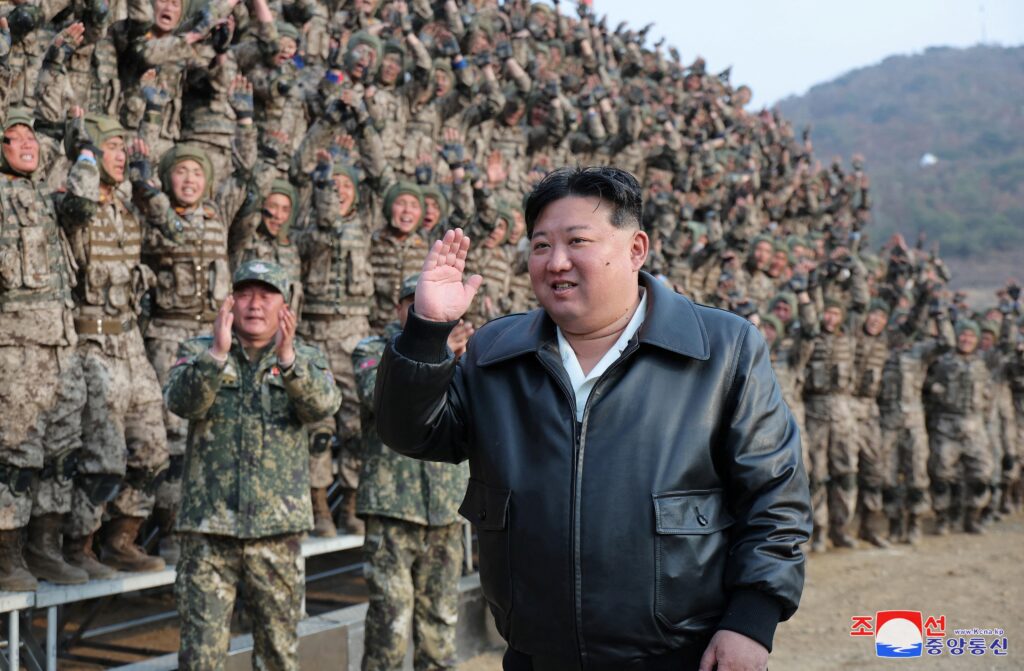In the shadow of rising tensions on the Korean Peninsula, North Korean leader Kim Jong Un has issued a chilling warning to South Korea, vowing to unleash nuclear strikes if provoked. The threat has sparked fear and uncertainty in the region, raising concerns about the potential for a catastrophic escalation of conflict. As the world watches with bated breath, the fragile peace between the two Koreas hangs precariously in the balance.
Kim Jong Uns Bold Threat to Destroy South Korea with Nuclear Strikes
Kim Jong Un recently made a bold threat to destroy South Korea with nuclear strikes if provoked. The North Korean leader stated that any aggression or provocation from South Korea would be met with swift and decisive action.
In a statement released by North Korea’s state media, Kim Jong Un warned that South Korea’s actions would not go unpunished. He claimed that North Korea’s nuclear capabilities were capable of destroying South Korea in an instant, and that they would not hesitate to use them if necessary. The threat has escalated tensions between the two countries, raising concerns about the potential for a military conflict in the region.
Update on North Koreas Aggressive Stance towards the South
Recent Events:
North Korea’s leader, Kim Jong Un, has recently ramped up his rhetoric against South Korea, threatening to destroy the country with nuclear strikes if it provokes North Korea. This aggressive stance comes after South Korea conducted military drills with the United States, which Pyongyang views as a threat to its sovereignty. Kim Jong Un’s warning has raised tensions on the Korean Peninsula, with fears of a potential conflict breaking out between the two nations.
International Response:
The international community has condemned North Korea’s aggressive stance towards the South, urging both parties to engage in dialogue to de-escalate the situation. The United Nations Security Council has called for restraint and peaceful negotiations to resolve the ongoing tensions. Despite the heightened rhetoric from North Korea, diplomatic efforts are still being made to prevent any further escalation of the conflict.
Analyzing the Global Impact of Kims Nuclear Threat
Kim Jong-un of North Korea has issued a chilling warning to South Korea, threatening to unleash nuclear strikes if provoked. This latest escalation comes amidst tensions in the region, as Kim seeks to assert his country’s power on the global stage. The threat of nuclear destruction has put the world on edge, with fears mounting about the potential consequences of such actions.
In response to Kim’s threats, South Korea has vowed to strengthen its defenses and work closely with allies to ensure the safety of its citizens. The international community has condemned Kim’s rhetoric, calling for a peaceful resolution to the escalating tensions. As the world watches nervously, the global impact of Kim’s nuclear threat looms large, highlighting the need for diplomatic efforts to prevent a catastrophic conflict.
Recommendations for De-escalation in the Korean Peninsula
:
In order to prevent further tensions and potential conflicts in the Korean Peninsula, it is imperative for all parties involved to consider the following recommendations:
- Engage in diplomatic negotiations to address underlying issues and grievances.
- Establish clear communication channels to avoid misunderstandings and miscalculations.
- Implement confidence-building measures to foster trust and reduce hostility.
| Recommendation | Description |
|---|---|
| 1. Diplomatic negotiations | Address underlying issues and grievances through peaceful dialogue. |
| 2. Clear communication | Establish channels to avoid misunderstandings and promote transparency. |
| 3. Confidence-building measures | Foster trust and reduce hostility through tangible actions. |
In Conclusion
the escalating tensions between North and South Korea serve as a stark reminder of the fragility of peace on the Korean peninsula. As Kim Jong Un’s threats of nuclear destruction loom large, the world watches with bated breath, hoping for a resolution that does not result in tragedy. It is imperative for both sides to engage in dialogue and prioritize diplomacy in order to prevent a catastrophic conflict that could have devastating consequences for the region and beyond. Only through dialogue and mutual understanding can we hope to achieve a peaceful coexistence.


